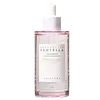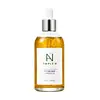What's inside
What's inside
 Key Ingredients
Key Ingredients

 Benefits
Benefits

 Concerns
Concerns

No concerns
 Ingredients Side-by-side
Ingredients Side-by-side

Centella Asiatica Extract 50.47%
CleansingWater
Skin ConditioningButylene Glycol
HumectantPropanediol
Solvent1,2-Hexanediol
Skin ConditioningAloe Barbadensis Leaf Extract
EmollientGlycereth-26
HumectantHydroxyacetophenone
AntioxidantGlycerin
HumectantCarbomer
Emulsion StabilisingTromethamine
BufferingPanthenol
Skin ConditioningEthylhexylglycerin
Skin ConditioningDisodium EDTA
Dipotassium Glycyrrhizate
HumectantAmmonium Polyacryloyldimethyl Taurate
Emulsion StabilisingBiosaccharide Gum-1
HumectantHyaluronic Acid
HumectantHydrolyzed Hyaluronic Acid
HumectantSodium Hyaluronate
HumectantHydroxyethylcellulose
Emulsion StabilisingChamomilla Recutita Flower Extract
MaskingMineral Salts
Skin ConditioningTripeptide-3
Skin ConditioningAcetyl Hexapeptide-8
HumectantAcetyl Octapeptide-3
HumectantCopper Tripeptide-1
Skin ConditioningPalmitoyl Pentapeptide-4
Skin ConditioningPalmitoyl Tetrapeptide-7
Skin ConditioningPalmitoyl Tripeptide-1
Skin ConditioningTripeptide-1
Skin ConditioningTripeptide-2
Skin ConditioningCentella Asiatica Extract 50.47%, Water, Butylene Glycol, Propanediol, 1,2-Hexanediol, Aloe Barbadensis Leaf Extract, Glycereth-26, Hydroxyacetophenone, Glycerin, Carbomer, Tromethamine, Panthenol, Ethylhexylglycerin, Disodium EDTA, Dipotassium Glycyrrhizate, Ammonium Polyacryloyldimethyl Taurate, Biosaccharide Gum-1, Hyaluronic Acid, Hydrolyzed Hyaluronic Acid, Sodium Hyaluronate, Hydroxyethylcellulose, Chamomilla Recutita Flower Extract, Mineral Salts, Tripeptide-3, Acetyl Hexapeptide-8, Acetyl Octapeptide-3, Copper Tripeptide-1, Palmitoyl Pentapeptide-4, Palmitoyl Tetrapeptide-7, Palmitoyl Tripeptide-1, Tripeptide-1, Tripeptide-2
Water
Skin ConditioningGlycerin
HumectantButylene Glycol
HumectantDipropylene Glycol
Humectant1,2-Hexanediol
Skin ConditioningNiacinamide
SmoothingPolyglycerin-3
HumectantAdenosine
Skin ConditioningBeta-Glucan
Skin ConditioningArginine
MaskingDipotassium Glycyrrhizate
HumectantSodium Hyaluronate
HumectantMallotus Japonicus Bark Extract
Skin ConditioningYeast Extract
Skin ConditioningHelichrysum Arenarium Extract
AntiseborrhoeicCopper Tripeptide-1
Skin ConditioningAcetyl Tetrapeptide-2
Skin ConditioningCarbomer
Emulsion StabilisingDextran
Hydroxyethylcellulose
Emulsion StabilisingCaramel
Cosmetic ColorantGlyceryl Acrylate/Acrylic Acid Copolymer
HumectantTrifluoroacetyl Tripeptide-2
Skin ConditioningXanthan Gum
EmulsifyingBoron Nitride
AbsorbentPvm/Ma Copolymer
Emulsion StabilisingAgar
MaskingGellan Gum
Calcium Alginate
MaskingCaprylyl Glycol
EmollientGlucosylrutin
AntioxidantPalmitoyl Tripeptide-5
Skin ConditioningTetradecyl Aminobutyroylvalylaminobutyric Urea Trifluoroacetate
Skin ConditioningMagnesium Chloride
Disodium EDTA
Water, Glycerin, Butylene Glycol, Dipropylene Glycol, 1,2-Hexanediol, Niacinamide, Polyglycerin-3, Adenosine, Beta-Glucan, Arginine, Dipotassium Glycyrrhizate, Sodium Hyaluronate, Mallotus Japonicus Bark Extract, Yeast Extract, Helichrysum Arenarium Extract, Copper Tripeptide-1, Acetyl Tetrapeptide-2, Carbomer, Dextran, Hydroxyethylcellulose, Caramel, Glyceryl Acrylate/Acrylic Acid Copolymer, Trifluoroacetyl Tripeptide-2, Xanthan Gum, Boron Nitride, Pvm/Ma Copolymer, Agar, Gellan Gum, Calcium Alginate, Caprylyl Glycol, Glucosylrutin, Palmitoyl Tripeptide-5, Tetradecyl Aminobutyroylvalylaminobutyric Urea Trifluoroacetate, Magnesium Chloride, Disodium EDTA
 Reviews
Reviews

Ingredients Explained
These ingredients are found in both products.
Ingredients higher up in an ingredient list are typically present in a larger amount.
1,2-Hexanediol is a synthetic liquid and another multi-functional powerhouse.
It is a:
- Humectant, drawing moisture into the skin
- Emollient, helping to soften skin
- Solvent, dispersing and stabilizing formulas
- Preservative booster, enhancing the antimicrobial activity of other preservatives
Butylene Glycol (or BG) is used within cosmetic products for a few different reasons:
Overall, Butylene Glycol is a safe and well-rounded ingredient that works well with other ingredients.
Though this ingredient works well with most skin types, some people with sensitive skin may experience a reaction such as allergic rashes, closed comedones, or itchiness.
Learn more about Butylene GlycolCarbomer is a polymer of acrylic acid. Its main role is to create a gel consistency.
A high amount of carbomer can cause pilling or balling up of products. Don't worry, most products contain 1% or less of carbomer.
Copper Tripeptide-1 (GHK-Cu) is a skin repairing ingredient known for its ability to boost collagen, improve firmness, and support skin regeneration.
It is a complex made up of a naturally occurring peptide (glycine-histidine-lysine) and copper, an essential trace element.
While studying wound healing, researchers noticed GHK-Cu stimulated hair follicle enlargement and growth by keeping hair in its active growth phase longer. This has made it a promising ingredient for hair regrowth treatments.
Some people have reported increased facial hair. While GHK-Cu can make your hair follicles bigger, it usually doesn’t turn soft, barely-visible facial hairs into thick, dark ones.
Anecdotal reports suggest that overusing copper peptides might lead to premature aging due to excess free copper or enzyme imbalances. This claim isn’t backed by large-scale studies.
Unfortunately, there are limited human studies for this ingredient. While early results are promising, many studies are either small, in-vitro, or not rigorously controlled.
For example, there is a 1998 study that explored the effects of copper tripeptide, vitamin C, tretinoin, and melatonin on skin repair and collagen synthesis.
After one month, increased procollagen production was seen in 7 out of 10 participants using copper tripeptide (more than those using vitamin C, melatonin, or tretinoin.
While the study was exploratory, it offers early evidence that copper tripeptide may support collagen production. Larger, well-designed trials are still needed to confirm its potential and understand individual responses.
Read more about other common types of peptides here:
Learn more about Copper Tripeptide-1Dipotassium Glycyrrhizate comes from licorice root.
Extracts of licorice have demonstrated to have antibacterial, anti‐inflammatory, antiviral, antioxidant properties.
One component, glabridin, has extra potent antioxidant and soothing properties. It has also been found to block pigmentation from UVB rays in guinea pigs.
Licorice Root also contains a flavonoid. Flavonoids are a natural substance from in plants. Flavonoids also have antioxidant properties.
Another component, glycyrrhizin, has been found to have anti-inflammatory and antimicrobial benefits. This may make licorice root extract effective at treating acne. However, more research is needed to support this.
Liquiritin is one of the flavone compounds found in licorice. It has been found to help lighten skin by preventing tyrosinase from reacting with tyrosine. When the two react, protein is converted to melanin. Melanin is the substance in your body that gives your features pigmentation.
Licorice root is native to Southern Europe and Asia. It has been used in traditional Chinese medicine to help with respiratory issues.
Learn more about Dipotassium GlycyrrhizateDisodium EDTA plays a role in making products more stable by aiding other preservatives.
It is a chelating agent, meaning it neutralizes metal ions that may be found in a product.
Disodium EDTA is a salt of edetic acid and is found to be safe in cosmetic ingredients.
Learn more about Disodium EDTAGlycerin is already naturally found in your skin. It helps moisturize and protect your skin.
A study from 2016 found glycerin to be more effective as a humectant than AHAs and hyaluronic acid.
As a humectant, it helps the skin stay hydrated by pulling moisture to your skin. The low molecular weight of glycerin allows it to pull moisture into the deeper layers of your skin.
Hydrated skin improves your skin barrier; Your skin barrier helps protect against irritants and bacteria.
Glycerin has also been found to have antimicrobial and antiviral properties. Due to these properties, glycerin is often used in wound and burn treatments.
In cosmetics, glycerin is usually derived from plants such as soybean or palm. However, it can also be sourced from animals, such as tallow or animal fat.
This ingredient is organic, colorless, odorless, and non-toxic.
Glycerin is the name for this ingredient in American English. British English uses Glycerol/Glycerine.
Learn more about GlycerinHydroxyethylcellulose is used to improve the texture of products. It is created from a chemical reaction involving ethylene oxide and alkali-cellulose. Cellulose is a sugar found in plant cell walls and help give plants structure.
This ingredient helps stabilize products by preventing ingredients from separating. It can also help thicken the texture of a product.
This ingredient can also be found in pill medicines to help our bodies digest other ingredients.
Learn more about HydroxyethylcelluloseSodium Hyaluronate is hyaluronic acid's salt form. It is commonly derived from the sodium salt of hyaluronic acid.
Like hyaluronic acid, it is great at holding water and acts as a humectant. This makes it a great skin hydrating ingredient.
Sodium Hyaluronate is naturally occurring in our bodies and is mostly found in eye fluid and joints.
These are some other common types of Hyaluronic Acid:
Learn more about Sodium HyaluronateWater. It's the most common cosmetic ingredient of all. You'll usually see it at the top of ingredient lists, meaning that it makes up the largest part of the product.
So why is it so popular? Water most often acts as a solvent - this means that it helps dissolve other ingredients into the formulation.
You'll also recognize water as that liquid we all need to stay alive. If you see this, drink a glass of water. Stay hydrated!
Learn more about Water